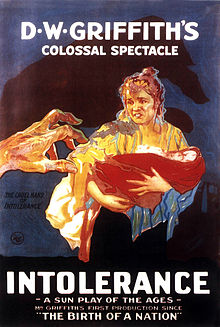| Intolerance | |
|---|---|
 Theatrical poster | |
| Directed by | D. W. Griffith |
| Written by | D. W. Griffith Hettie Gray Baker Tod Browning Anita Loos Mary H. O'Connor Frank E. Woods |
| Produced by | D. W. Griffith |
| Starring | Vera Lewis Ralph Lewis Mae Marsh Robert Harron Constance Talmadge Lillian Gish Josephine Crowell Margery Wilson Frank Bennett Elmer Clifton Miriam Cooper Alfred Paget |
| Cinematography | Billy Bitzer |
| Edited by | D. W. Griffith James Smith Rose Smith |
| Music by | Joseph Carl Breil Julián Carrillo Carl Davis (for 1989 restoration) |
| Distributed by | Triangle Distributing Corporation |
Release date |
|
Running time | 210 minutes (original release) 197 minutes (most surviving cuts) |
| Country | United States |
| Language | Silent (English intertitles) |
| Budget | $385,907[1] |
| Box office | $1.75 million (theatrical rental) |
Intolerance is a 1916 epic silent film directed by D. W. Griffith. Subtitled as Love's Struggle Throughout the Ages and A Sun-Play of the Ages,[2][3] the three-and-a-half-hour epic intercuts four parallel storylines, each separated by several centuries: first, a contemporary melodrama of crime and redemption; second, a Judean story: Christ's mission and death; third, a French story: the events surrounding the St. Bartholomew's Day massacre of 1572; and fourth, a Babylonian story: the fall of the Babylonian Empire to Persia in 539 BC. Each story had its own distinctive color tint in the original print.[3] The scenes are linked by shots of a figure representing Eternal Motherhood, rocking a cradle.[3]
Griffith chose to explore the theme of intolerance partly in response to his previous film The Birth of a Nation (1915) being derided by the NAACP and others for perpetuating and supporting racial stereotypes and glorifying the Ku Klux Klan.[4][5] Intolerance was not, however, an apology, as Griffith felt he had nothing to apologize for;[6] in numerous interviews, Griffith made clear that the film was a rebuttal to his critics and he felt that they were, in fact, the intolerant ones.[7] In the years following its release, Intolerance strongly influenced European film movements and is regarded as one of the most influential films of the silent era.[6] In 1958, the film was voted number 7 in the World Expo film poll. In 1989, it was one of the first films to be selected for preservation in the United States National Film Registry.
- ^ Cite error: The named reference
Schickelwas invoked but never defined (see the help page). - ^ Internet Archive for Intolerance (1916), D. W. Griffith. Retrieved May 21, 2016.
- ^ a b c Cite error: The named reference
filmsitewas invoked but never defined (see the help page). - ^ Cite error: The named reference
NAACPwas invoked but never defined (see the help page). - ^ Cite error: The named reference
TCMarticlewas invoked but never defined (see the help page). - ^ a b Cite error: The named reference
Rapoldwas invoked but never defined (see the help page). - ^ Cite error: The named reference
McEwanwas invoked but never defined (see the help page).